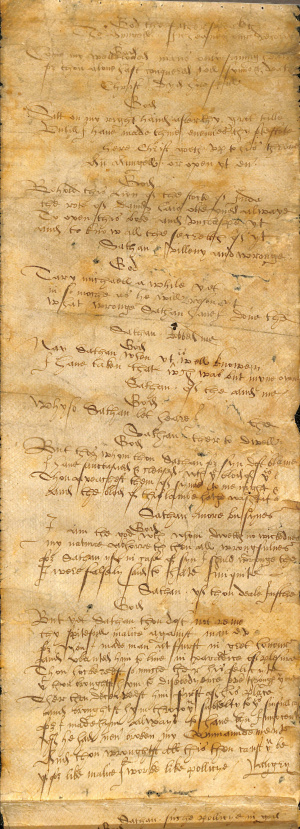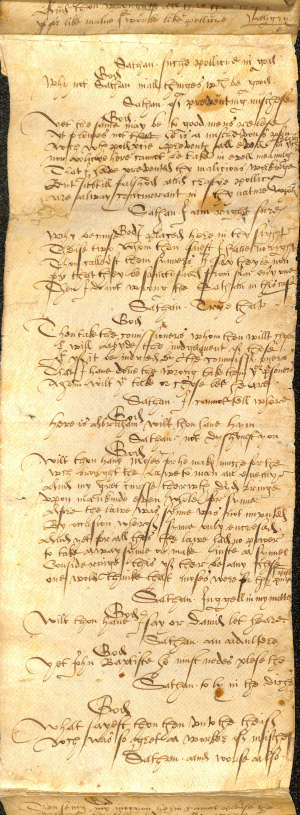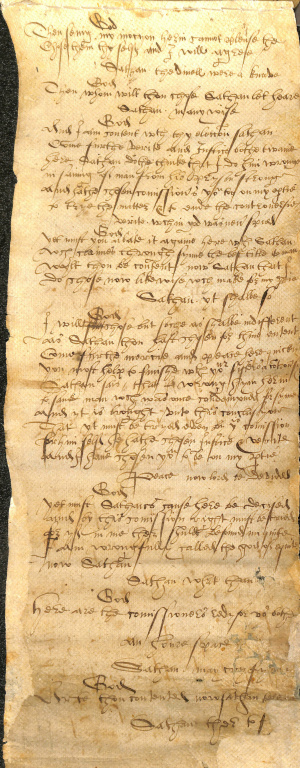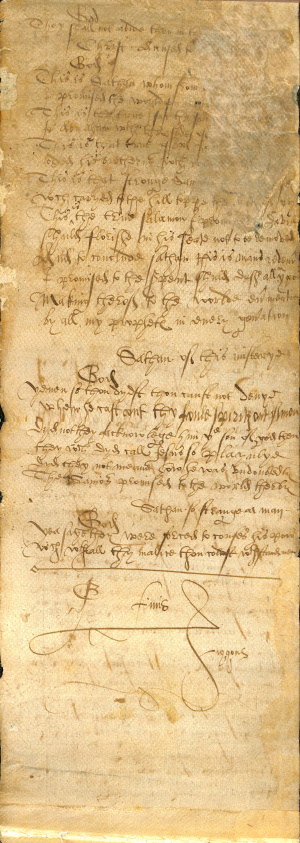Processus Satanae
Historical Records
An actor's part exists for the role of 'God' in this play; it is currently held by a private collection in the United Kingdom. Although most of the lines belong to God, a partial list of other characters from the play can be reconstructed through references and cues:
Characters:
- God the Father
- Christ
- Michael
- An Angel
- Verity
- Justice
- Mercy
- Peace
- Satan
"The Part of God", MS (transcription)
Strip 1a
God the father speaketh
The Aungell . In heauen our record
God
Come my welbeloued mans only sauing hea<l..
for thou alone hast conquered hell synne & death<
Christ. Dyd hole spill
God
Sitt on my right hand after thy gret toille
Vntill I haue made thine enemies thy fotestole
Here Christ goeth vp to his throne<
An Aungell . or open yt euer.
God
Behold this Lion of the stocke of Iuda
the rote of Dauid hais obteyned alwaye
To open this boke and vnclaspe yt
and to know all the secrettes of yt
Sathan . Villeny and wronge .
God
Tary michaell a while yet
in so moche as he will reson yt
what wronge Sathan haue I done the
Sathan . Robbed me
God
Nay Sathan when yt ^is well knowen
I haue taken that wch was but myne owne<
Sathan . of the and me /
God .
Why so Sathan let heare I the
Sathan . ther to dwell .
God
But thos whom thou Sathan for syn dost blame
I haue sanctified & clensed with ye blod of yis <l
Thou apeachest them of synne to me night & <
and the blod of this lambe hathe washt it <a
Sathan . more busynes
God .
I am the god wth whom dwelles no wickednes<
my nature abhorreth then all wrongfulnes
for Sathan yf in case of syn I shuld wronge the
I were falsely said to hate iniquite ~
Sathan . yf thou deale Iustice
God
But yet Sathan thou dost not reme<
thy spitefull malice against man ev< .
for when I made man at furst in gret honour
and planted him to liue in paradice of pleasure
Thou hockeredst so much ther his felicyte
yt thou broughtst hym to disobedience even through yy env<y
Ther thou deceyvedst him first of his place
and broughtst hym throw yy subtelty to yis sinfull ca<s
for I made hym always to haue byn Innocent<
Yf he had neuer broken my Commaundement
And thou wroughtst all this then canst yu be
yf for like malice I worke like pollicye / |angry
Strip 2a
Sathan . suche pollicye in god
God
Why not Sathan in all thinges wch be good .
Sathan . of preventing mischefe
God .
Yet the same may be to good mens relefe /
yt folowes not that he is a mischievous person
Wch wth pollycie preventes all evell in ych^Season<e
nor policye here cannot be taken in evell meaning
That I have prevented thy malicious workinge
But subtill falshod and craftye pollicy
are always concurrant in thy nature wholy
Sathan . I am right sure /
God
Why because, I placed here in thy sight
Theise two whom thou saiest I haue no right<
Thou calledst them synners I say they be non
for that they be sanctyfied from syn euery one<
Then I do not wrong the Sathan in this case<
Sathan . Trye that –
God
Then take the comissioners whom thou willt chose<
I will abyde the iudgement of those .
Yt yf it be iudged by the commissyoners
That I haue done the wrong take them yer pisoners<
Whom wilt yu take or chose let heare .
Sathan . I cannot tell where
God
Here is Abraham wilt thou haue hym .
Sathan . not dyshonest you
God
Wilt thou haue Moses for he makes muche for the
wch brought the Lawe to man an enemy
And my gret curse therwth dyd bringe
Vpon mankinde even whole for synne
Afore the lawe was synne was not imputed
By occasion wherof synne only encresed
And yet for all this the lawe had no power
to take away synne or make iuste a synner
Consideringe this yf ther be any chose
one wold thinke that moses were for thy pur^pose
Sathan . Iuggell in my matte<
God
Wilt thou haue Isay or Dauid let heare
Sathan . an adultere<
God
Yet Iohn Baptiste he must nedes plese the
Sathan . to ly in the diche<
God
What sayest thou then vnto the theif
Wch was so gret a worker of mischef<
Sathan . and worse also .
Strip 3a
God
Then seing my mocyon herin cannot please the
Chose them thy self and I will agree /
Sathan . the diuell were a knave
God
Then whom wilt thou chose Sathan let heare .
Sathan . in any wise
God
And I am content wth thy eleccion sathan .
Come further Verite and Iustice bothe twaine
Here Sathan dothe thinke that I do him wronge
in sauing of man from his pryson strong
and hathe chosen comissioners you too on my partie
to trye the matter & to ende the controuersie /
Verite . wch in god was neuer spied
God
Yet must you abate it againe here wth Sathan .
Wch claimes through synne the best title to man
Wylt thou be content now Sathan that I
Do chose now likewise wch make for my partie
Sathan . yt shalbe so
God
I will[ ser ]chose but soche as shalbe indifferent
as Sathan thou hast chosen for thine entent
Come furthe mercie and peace here quickly
You most help to finishe wth your sisters a controuersy<
Sathan sais / that I wrong hym herin
to saue man wch was once condempned for synne<
and yt is brought vnto this conclusyon
That yt must be tryed even by yis comission
for him self he hathe chosen Iustice & verite
and I haue chosen you to be on my partie
Peace now lord be devided
God
Yet must Sathans cause here be decised
and by this comission right must be tried
for yf in me ther shuld be found iniquite
I am wrongfully called the god of equite
now Sathan .
Sathan . what than .
God
Here are the comissioners redy for vs bothe
an houre space
Sathan . may cry fy on y<
God
Arte thou contented now sathan tell m<e
Sathan . ther to f<.
<lpd-pre>
Strip 3b<lpd-pre>
God
They shall not abide then in this Courte celestiall
Christ . Accused to my father
God
This is Sathan whom from the begynnyng<e
I promised the world for m<an>s transgressing
This is the true Isac the son of promisse
to Abraham wth the sede of <…………
This is that true Ioseph wch <in dang..
loded his bretherne with cor<ne> to th<e>r fath<
This is that stronge Sampson & mighty <Ius..
wch caryed to the hill toppe the gates of gaz<a
This ^is the true salamon I promised t<o> David
shuld florishe in his seate not to be removed
And to conclude sathan this is mans redemer
I promised to the s3pent shuld dash all yy po<wr
Making therof to the worlde euer mentio<n
by all my prophetes in euery generation
Sathan . of this misterye
God
Yeuen so thou dydst thou canst not denye
When he cast out thy foule spirites out of men
Dyd not they acknowlege him ye son of god then<
they wch dyd call Iesus so playnlye
Dyd they not meane how he was vndoubtedly
The Sauior promised to the world therby
Sathan . so strange a man .
God
Yea saye they were forced to confes his powr
Wch wth all thy malice thou coldst withstand neuer
◇--------------------------------------------
G
finis
Jiggons
Theatrical Provenance
Noting the inscription “old verses | Frõ limebrook” on the outside of the role, and observing that the “Limebrook” meant must be the village two to three miles from Brampton Bryan, the Harleys’ home, Chambers concludes that “There seems little doubt, therefore, that this was a local product of north Herefordshire on the very border of Wales” (240). The competent but unidentified hand of the scribe leads Chambers to conjecture a date of c.1570-80. Harbage opts for a smaller range of c.1570-75 and assigns it to 1575; Wiggins prefers an earlier date of 1564 on the grounds that the 1570s are quite late for God to appear on the English stage.
Probable Genre(s)
Biblical.
Possible Narrative and Dramatic Sources or Analogues
<Enter any information about possible or known sources. Summarise these sources where practical/possible, or provide an excerpt from another scholar's discussion of the subject if available.>
References to the Play
Information welcome.
Critical Commentary
Palfrey and Stern contextualise the manuscript alongside other actors' parts from England and the Continent, noting that the 'part of God' is "the first English part to survive with cues, generally of three or four words. Yet it differs in one significant aspect from the other rolls: in this part the speaker of the cue is named" (19).
See Wiggins 382 ("Religious play").
For What It's Worth
Among the curious features of the “part” is the stage direction “an houre space”, which Chambers takes to mean “that God here withdraws and that the play proceeds for an hour before his presence is again required” (241).
Works Cited
Site created and maintained by David McInnis, University of Melbourne; updated 15 June 2018.



